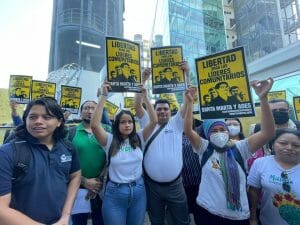NOVANEWS

teleSUR
teleSUR talks to the Broad Front’s Carlos Alejandro, to understand in more depth the elections and their consequences.
teleSur: Carlos, what have been the standout points of the Broad Front’s campaign?
Carlos Alejandro: There is no political debate in the second round of elections. Really, the right wing has been knocked back, they experienced a serious setback in the first round. They really thought that polls would be right, and that the Broad Front wouldn’t get more than 45 percent of the votes.
The main point of this campaign is to uphold the Broad Front government’s achievements in all areas, especially those related to freedom and equality.
Over the past 10 years, we’ve approved a series of laws, like establishing the 7-hour work day for rural workers; a domestic worker law limiting the number hours they are allowed to work.; the same sex marriage act, a sexual and reproductive health law, which includes legislation on abortion. We want to clarify that it is not an abortion law, because that is one of the themes being debated.
Also being debated is the widening of political engagement among the population; a freedom of information law; the barriers to education; the role of women in politics; all of these are central to the election debate, coming above even economic matters. It’s a rare thing when the economy gets overshadowed in an election … it’s the only political debate they are having in Brazil.
Here in Uruguay what we’re debating is how to better ourselves, how to create better conditions, which is a debate we don’t want to have with the right wing, because they’ve shown us for the past 150 years that they cannot take care of those problems, problems we are resolving, and laying the ground work to have that debate with the people who will truly benefit from these policies.
TS: You have said that if Vazquez is re-elected, he would carry on with the Broad Front’s policies. However, there are many controversial policies that Jose Mujica implemented, like abortion, and the marijuana law, which Vazquez is known to oppose. What will happen if he is elected with regard to these topics?
CA: Tabare was against these projects. He didn’t support them, and furthermore, during his last administration, he vetoed the same law that was later approved under Mujica. But as they are both from the Broad Front, which passed the law, it’s not up for discussion. Nothing will change from the way it was approved during Mujica’s government. There is no political sign that suggests that Tabare will erase what Mujica did.
Regarding the marijuana law in particular, it is very clear within the party, that it is a law still being studied and analyzed, that can and will be corrected if necessary; it is new not only for Uruguay, but in the whole world; we know there are other places who have had similar experiences, like in some of the states in the U.S., but in our case, we want to resolve the drug problem, take the market for marijuana away from organized crime, and create conditions to rehabilitate not only marijuana users, but hard drugs too.
In this sense, our aim is to deepen the changes we have already made, improve what has been done, and improve what has been done badly.
TS: How is Vazquez viewed in Uruguay?
CA: Tabare is a man of the people, what we call “de a pie,” down to earth. He comes from a similar humble background as many other Uruguayans.. The Right cannot forgive him for paving the way —via his education and intellect— for the Left to get into power.
Tabare is a man of the Left, even though the political pragmatism he uses makes him seem more centrist, and not as left-wing as many would like; but he has a great feel for politics, and what both he and Mujica can do effectively is scope out what the people want, but in different ways.
Tabare ended his term with approximately 68 percent of approval, which shows that, beyond the problems that existed during that administration, Tabare ultimately received approval for what he did during his term. And I believe that the result of the October 26 elections shows that the Uruguayan people support his candidacy again.
TS: And how is right wing perceived the Uruguayan people?
CA: I think that the clearest example is that the Right didn’t have a clue how to face the second round of the elections. I’ll reiterate what I said before, they relied too heavily on the polls; they thought they were doing well, so did not work to create the conditions in case the scenario changed.
TS: Do you think that the Brazilian election result might influence the results in Uruguay?
CA: Not for this runoff, but yes, I do believe that the political change in the last days in the Brazil elections, with Marina Silva leading in the polls for so many months, and the possibility that the PT could lose the elections, caused some to be nervous, and a little bit worried. Not only us left-wing activists, but among people who would not necessarily identify themselves as left-wing.
TS: What challenges would a new Broad Front government face?
CA: I have said for many years that the most important thing is to not let down the electorate which voted for us and gave us the opportunity to govern. We have developed all of our policies that aim to improve the quality of people’s lives based on this basis; where we can keep generating societal change and evolution, and most importantly, within a region which is our neighborhood. Latin America is our neighborhood from which we relate to the rest of the world. In this sense, our internal policies have an external objective; to project the country within the region, prioritizing regional integration.
TS: So a Tabare Vazquez government would strengthen regional integration?
CA: Yes, definitely. We’re trying to create the conditions to solidify existing regional integration effortslike MERCOSUR, UNASUR, CELAC, ALBA … those projects are here to stay, and we want to make them robust.
We have shown we are a serious political party, dealing with, for example, the case of the Syrian refugees, and the problem of the Guantanamo prisoners. Doing so doesn’t mean we’re trying to cover-up for, or save Obama’s administration, but instead we are trying to resolve the situation for the prisoners, and help Guantanamo to go back to being part of Cuba.
TS: The case of the Syrian refugees is very interesting…
CA: Let me tell you an anecdote. The union for bank workers has a place for the children of its members to live in Montevideo if they go there to study. When President Mujica announced that Syrian families — who were refugees in Lebanese camps — would come to Uruguay, the young people living in the union’s accommodation talked to the leadership, and offered to share their bedrooms with the Lebanese translators who are there to help the Syrians with their Spanish, and adapting to life in Uruguay. For us, that gesture is not only seen as a humanitarian act, but it means that our youth is getting involved in a political issue that does not directly affect them, far away from our borders. That is very important to us, that they get involved, and understand what is it about.
This also shows the possibility and the capability that we have to resolve these issues. To welcome these Syrian families in Uruguay, so they can work here, have a life here. And it is the same with Guantanamo, a topic that Pepe [Mujica] said was not suspended, but on hold until November 30; and that after the elections, regardless who is the new president, he would continue to advocate for, and engage in, negotiations, so those six prisoners without a sentence can come to Uruguay and be free here. This is a very important political gesture by the Broad Front that needs to be highlighted, and it will reverberate with future governments.
Carlos Alejandro is the Broad Front’s director of international relations, as well as member of the Broad Front Commitment group. A member of the Broad Front since 1983, he has a background of union activism.



